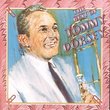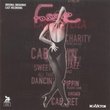| All Artists: Richard Wagner, Karl Bohm, Bayreuth Festival Orchestra, Birgit Nilsson, Christa Ludwig, Claude Heater, Eberhard Waechter, Eberhard Wchter, Erwin Wohlfahrt, Gerd Nienstedt Title: Tristan und Isolde Members Wishing: 0 Total Copies: 1 Label: Deutsche Grammophon Release Date: 11/11/1997 Album Type: Box set Genre: Classical Styles: Opera & Classical Vocal, Historical Periods, Modern, 20th, & 21st Century Number of Discs: 3 SwapaCD Credits: 3 UPC: 028944977226 |
Search - Richard Wagner, Karl Bohm, Bayreuth Festival Orchestra :: Tristan und Isolde
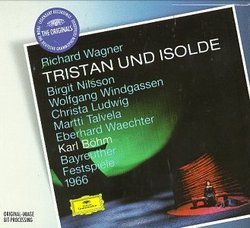 | Richard Wagner, Karl Bohm, Bayreuth Festival Orchestra Tristan und Isolde Genre: Classical
Recorded in performance, but one act at a time so that the principals could sing full-out, this is one of the most electrifying opera recordings of the stereo era. Birgit Nilsson blazes as Isolde, and Wolfgang Windgassen's... more » ![header=[] body=[This CD is available to be requested as disc only.]](/images/attributes/disc.png?v=15401716) ![header=[] body=[This CD is available to be requested with the disc and back insert.]](/images/attributes/disc_back.png?v=15401716) ![header=[] body=[This CD is available to be requested with the disc and front insert.]](/images/attributes/disc_front.png?v=15401716) ![header=[] body=[This CD is available to be requested with the disc, front and back inserts.]](/images/attributes/disc_front_back.png?v=15401716) |
Larger Image |
CD DetailsSynopsis
Amazon.com Recorded in performance, but one act at a time so that the principals could sing full-out, this is one of the most electrifying opera recordings of the stereo era. Birgit Nilsson blazes as Isolde, and Wolfgang Windgassen's Act-III evocation of the delusional Tristan is heart-wrenching. Karl B"hm inspires transcendent playing from the Bayreuth forces, and the sound is stunning. --Ted Libbey Similarly Requested CDs
|
CD ReviewsOverwhelming - but not the best! cdsullivan@massed.net | Cambridge, MA USA | 10/29/2000 (5 out of 5 stars) "This recording of "Tristan und Isolde" was made live at the 1966 Bayreuth Festival. It was a separate performance, though, designated for this recording, and recorded an act at a time so that the singers would be able to sing "all out" in every act. While the results are not flawless, the compelling drama and power of this "Tristan" are something to marvel at, and in my final rundown this gets the silver medal for best "Tristan."First and foremost is the magnificent supporting cast, by far the best on any recording. Martti Talvela, the great Finnish bass, sings a gorgeous Marke, superbly shaping his long Act II monologue and producing bronze-colored, resonant tone throughout. He is by far the best King on disc. Christa Ludwig sings Brangäne, perhaps the key supporting character, with glorious, creamy tone and deep insight; the finest Brangäne I have ever heard. The supporting cast is rounded out by Eberhard Wächter, a superb Kurwenal, and (luxury casting) Peter Schreier as the sailor. The chorus contributes excellent work.Only slightly below this towering standard are Birgit Nilsson (Isolde) and Wolfgang Windgassen (Tristan). Nilsson's Act I is one of the most magnificent vocal achievements on record. She attacks each exposed high note with total security and perfect intonation, and sings intensely and powerfully, here at least the equal of Flagstad. Her Act II is not as good, though, because here she has to sing softly and beautifully (never her strong points), and while she is admirable, she doesn't evoke that sense of awe at the sheer quality of voice that comes from Flagstad. Her two Act III monologues are excellent, particularly her earlier one ("Ich bin's, ich bin's, süssester Freund"). The Liebestod (or "Verklärung" [Transfiguration] as Wagner would have it) is powerful and harrowingly intense, but again there could be smoother legato and more beautiful tone. I must stress here, though, that this is a live performance; considering that, her achievement here is astounding. She is one of the best Isoldes on disc. Her Tristan is Wolfgang Windgassen. Windgassen was essentially a powerful but lyric tenor; only through his intelligence could he produce portrayals as magnificent as his Siegfried and his Tristan, captured here. He shows himself to be the most liquid-toned of Heldentenors, with a beautiful, soft-toned voice. His voice is not ideal for Tristan (this incredibly taxing role requires a voice of DARK beauty, in addition to a ringing top, neither of which belongs to Windgassen), but what he does with what he has is another matter. His Act III madness is both frenzied and profound, and all the time beautifully sung. It is only in the heaviest passages of all (e.g. when he curses the love potion or his last "Zu ihr!") that I feel a more powerful voice is needed. Windgassen was unquestionably the best Heldentenor at the time of this recording, and is almost as good as Suthaus (Furtwängler) and Vickers (Karajan), who had the huge advantage of recording their performances in a studio.Karl Böhm conducts. He takes fast tempi throughout, and while in the dramatic parts (as in the beginning of Act III, Scene 3) this works magnificently, his fierce approach doesn't work in the more lush, romantic scenes ("O sink hernieder" to the end of the love duet, the Liebestod, etc). He is consistent, though, and I suppose having whip-fast tempi is better in this work than having funeral tempi (like Bernstein), but there is a middle road, which Furtwängler and Karajan take. However, a huge gain resulting from his fast tempi is that the whole opera can be fitted onto three discs, one for each act. Böhm gets very good playing from the Bayreuth Festival Orchestra, even if it is not as refined or beautiful as the playing of the Berlin Philharmonic for Karajan or the Philharmonia Orchestra for Furtwängler.Of the three recordings I have heard, here are my verdicts. Karajan (EMI/Angel): gorgeous sound, well-judged tempi, a magnificent Tristan in Jon Vickers - but the final result is decidedly underwhelming: there is none of the essential ardent fire behind the glossy exterior, and Dernesch as Isolde is not nearly powerful enough. Böhm: a fast, intense recording; if at times it is not as lyrical and beautiful as it could be, it is far preferable to Karajan's superficiality. But my first choice is, and will always be, Furtwängler (EMI). He has the best pair of lovers and the best orchestra, and he himself is overwhelming. It will be reissued at mid-price next year, but at the moment is very much full price (about $64). If you're on a budget, get this Böhm recording. It's cheap ($36), exciting, and an excellent introduction to this astounding piece of music. Happy listening!" The Greatest Recording Of The Greatest Opera Joseph Kimsey | Pac NW | 01/11/2005 (5 out of 5 stars) "Even though I consider The Ring to be the most perfect work-of-art in music history, Tristan und Isolde is, to my mind, the ultimate artistic experience that a person can possibly experience in a single evening. Every facet of this masterpiece is stunning. From the famous Prelude to Act I that inaugurates the emotional abyss, to the orgasmic Act II, the emotionally shattering Prelude of Act III, and finally the painfully transcendental Liebestod. I just get chills when I consider the circumstances that surround this music drama. Wagner was reeling from his breakup with the beautiful and talented Mathilde Wesendonck, the wife of his patron. Wagner was strapped financially, and near penury. He also encountered the profoundly revealing philosophy of Arthur Schopenhauer's The World as Will and Representation. All of these events proved to be the necessary catalysts to galvanize Wagner's towering genius into creating something wholly novel in the world of art. Drawing on lost love, philosophical pessimism, transcendental redemption, and an incredible intellect, Wagner forever altered Western music with Tristan. This Bayreuth performance is flawless. Nilsson is a force of nature. Windgassen is the greatest heroic tenor on disc, and all of the supporting cast is top notch. One really can't say enough about Nilsson. She is phenomenal in the taxing second act; she even manages to outdo herself in Act III. Bohm's direction is breathtaking; tempos never lag and no element of the orchestra overshadows any other. The Bayreuth acoustics are rightly haled as the most conducive in conveying the texture and richness of Tristan. Of all of Wagner's artistic innovations, the most consistently maligned is his libretti. I disagree when it comes to Tristan. While my knowledge of German is elementary, if the translation provided is anything to go on, Wagner surpassed himself with this opera. Isolde's farewell aptly describes my feelings about this dark masterpiece: "In the surging swell, in the ringing sound, in the vast wave, of the world's breath - to drown, to sink unconscious - supreme bliss!"" Bayreuth at its best Klingsor Tristan | Suffolk | 08/18/2005 (5 out of 5 stars) "I was lucky enough to be present at the last outing of this Wieland Wagner production with essentially the same cast - the curtain calls went on for more than 45 minutes!
Undoubtedly, this is a totally exceptional performance - one of those live performances that catches fire from the first enigmatic rise and fall to the famous 'Tristan' chord and never lets you go until long after the last note of the Liebestod has died away. Bohm (often accused of being kapellmeisterish at the time) is electric - the music ebbs and flows with the passion of the protagonists, at times whipped up to almost hysterical proportions (Tristan's Act 2 arrival and the height of his dementia in Act 3 for example), at others achingly lonely (Marke's monologue or the shepherd's piping come to mind). The singing, too, is unsurpassed. Nilsson and Windgassen are in superlative form throughout - Windgassen tired in Act 3? His character is dying, for God's sake - and he certainly rises to the excitements of Isolde's arrival and the ripping of the bandages from his wound. Christa Ludwig sings Brangane's warnings from the tower with a haunting rapture that matches that of the lovers downstage. The much-missed Martti Talvela sings his (presumably huge) socks off as Marke, turning a character who can be a bore into, for his moment, the most sympathetic and moving person in the opera. I've never got it with Furtwangler and Flagstad by the time of that performance sounded too maternal for my taste. Bernstein is brave and at times fascinating but his cast aren't as good. Karajan is too overcooked and Vickers - often a great Tristan on stage - was too self-indulgent here. Kleiber (who I also heard, magnificently, at Bayreuth) conducts wonderfully and has a beautifully sung Isolde in Margaret Price, but his Tristan is the rather pedestrian Kollo. For me, this Bohm recording is the yardstick Tristan and a great example of Bayreuth at its absolute best. The engineers capture the unique Bayreuth sound well, too. " |

 Track Listings (7) - Disc #1
Track Listings (7) - Disc #1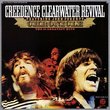
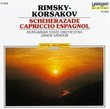

![The Best Of Kansas [Remaster]](https://nationalbookswap.com/cd//m/43/0743/10743.jpg)
